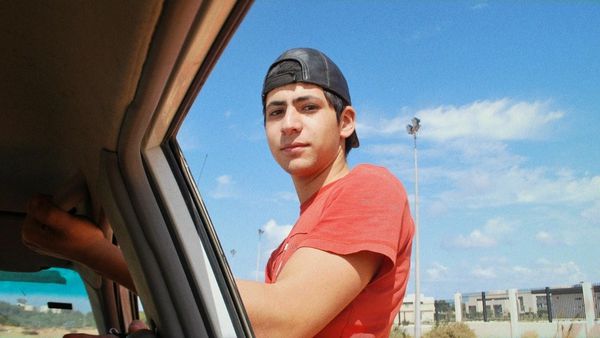Eye For Film >> Movies >> Donga (2023) Film Review
Donga
Reviewed by: Amber Wilkinson

Mohammed - nicknamed Donga - was just 19 years old when he arrived at the frontline of the 2011 uprising with a camera. Muhannad Lamin’s film is built around the footage shot by Donga between then and 2019 and the cameraman’s considerations of it as he rewatches it in 2021 while he undergoes hospital treatment. It charts not just the landscape of Libya during the period but the physical and mental impact the conflict has left on those like Donga.
A film built on intimacy with its subject, it is strongly edited by Lamin and Khalid Shamis so that sometimes we fast-forward or rewind as the various uprisings play out. This is the first time Donga has watched the footage he shot in 2011 in a decade and he’s honest about the impact it has had on him, noting that his involvement in various conflicts has left him triggered by both gasoline and blood.
Looking at the footage, it’s easy to see that he was just a kid when he started out, the risk-taking attitude that many teenagers have fully on display as he and his friend head to their “first battle”. This gung-ho attitude is in sharp contrast to his current day observations, in which he notes that when you’re covering a war, “nothing is closer than death”.
While the film captures the shift in Donga’s attitude, as he increasingly counts the cost of war, it also shows how the conflict itself shifted into something much more serious down the years. What starts out as a spontaneous uprising in 2011, with the conflict largely built on skirmishes, becomes much more deadly by 2019, when laser-sighted and drone warfare becomes prominent. Donga’s footage thrusts us into these tense and unpredictable moments, giving a sense of the volatility involved.
While some knowledge of Libya’s recent turbulent history would be useful, since Lamin only provides basic details of the various conflicts, this is a film that is primarily concerned with the impact of war on populations - and, particularly, the young. Snippets of a break in Tunis bring home the teenage experiences of relaxing in cafes and listening to music that Donga was largely deprived of in favour of hanging out in a warzone. His joy at spotting a familiar face in the old footage of someone who has not been killed in the intervening years also speaks volumes about the enormous loss of life his generation have endured.
Immersive and visceral - and it must be noted this film doesn’t hold back on injury detail - Lamin’s film brings home the way that something which seems comparatively normal in the moment can spark entirely different emotions when viewed in retrospect. It is also a melancholic tribute to a generation who have lost much and gained little through war.
Reviewed on: 26 Apr 2024















